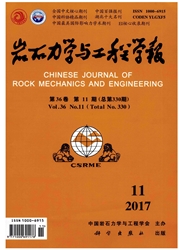

 中文摘要:
中文摘要:
在高放废物深地质处置缓冲/回填材料研究中,缓冲材料作为填充在废物罐和地质体之间的最后一道人工屏障,起着水力学屏障的重要作用,阻止地下水流至废物罐表面,同时阻止废物核素渗漏至围岩中。因此,研究膨润土的渗透性可以为处置库设计提供重要的基础参数。通过6组膨润土常规变水头渗透试验,分析渗透系数随时间的变化关系,得出渗透系数随时间的变化曲线。根据膨润土物理化学特性、变水头渗透原理和试验的环境条件,分析渗透系数变化曲线形成的原因和数据测量的准确性,进而进行渗透系数的误差分析,并根据误差产生的原因提出改进试验方案,即采取封闭试验系统消除水分蒸发的影响,并进行可行性分析。
 英文摘要:
英文摘要:
In deep geological disposal for high-level radioactive waste,the buffer and backfill materials between waste tank and surrounding geological body play an important role as hydraulic barrier. The engineered barrier made by densely compacted bentonite is used to prevent the groundwater infiltrating and the radioactive waste diffusing. The research on bentonite can provide essential parameters for the deep geology disposal of nuclear waste. Through six groups of bentonite variable head permeability experiments,the relationship between permeability coefficient and time is analyzed and the permeability curves of bentonite samples and time are obtained. Then according to the physical and chemical conditions of bentonite,the variable head permeability principle and the environmental conditions of experiments,the reasons about the relationship of the permeability coefficient with time and the accuracy of the data are analyzed. Finally,the measurement errors and feasibility of variable head permeability experiment are analyzed,according to the reasons of measurement errors;and it provides an improved method to test the permeability of compacted bentonite.
 同期刊论文项目
同期刊论文项目
 同项目期刊论文
同项目期刊论文
 期刊信息
期刊信息
